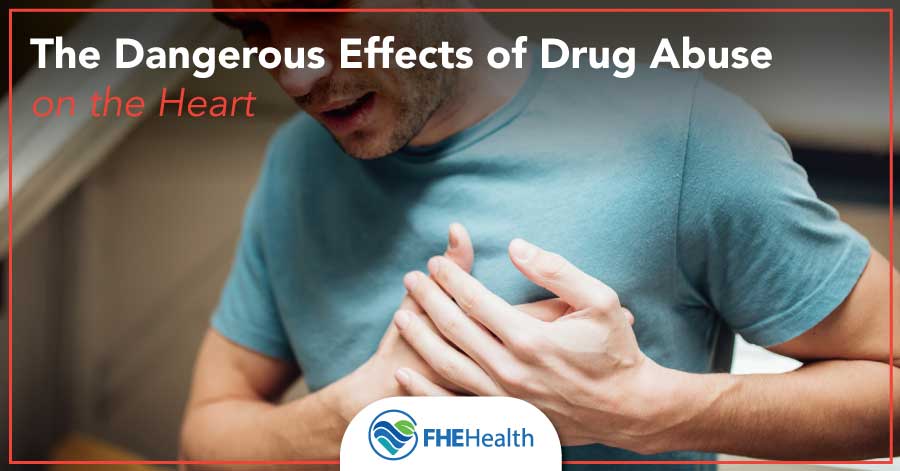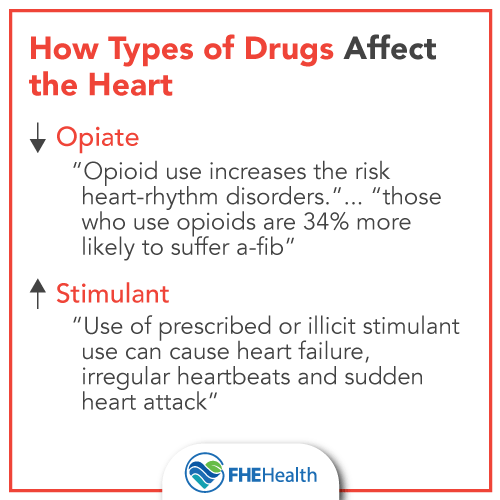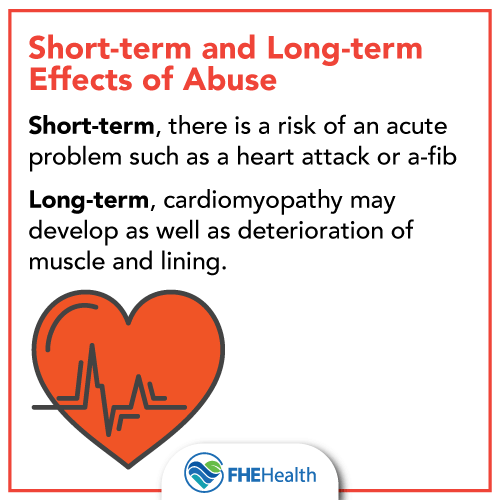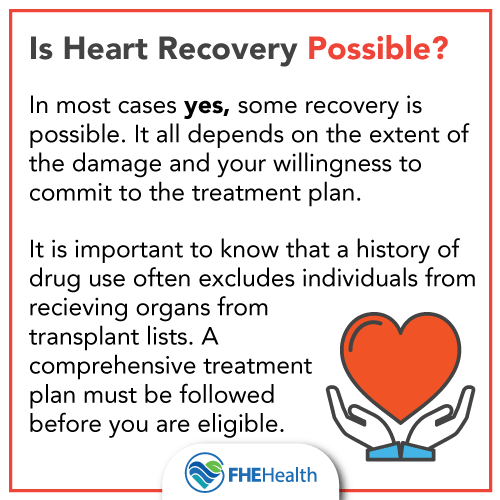
How Drug Abuse Damages the Heart
Can drug abuse damage the heart? The answer to that is yes, according to the National Institute on Drug Abuse. The type of impact ranges widely, from creating abnormal heart rates to putting you at risk for a heart attack. Injections themselves pose risks as they damage the veins and create the potential for infections. Though many men and women understand that illicit drugs or abuse of prescription drugs can cause damage to a person’s emotional and physical health, many don’t recognize the underlying destruction they can cause to the body itself.
How Do Opiates Damage the Heart?

Opioids, which are commonly prescribed for conditions such as chronic pain, can increase the risk of painkiller abuse. The Centers for Disease Control and Prevention also link opioid use to a higher risk of heart attacks, congenital heart defects when used by a pregnant mother and increased risk of heart failure in older adults. When you use them for pain management by prescription, you’ll need to work closely with your doctor to ensure addiction and overuse do not occur to avoid these potential risks.
How Do Stimulants Damage the Heart?
Stimulants such as dextroamphetamine, Adderall and methylphenidate (Ritalin) can also create damage to the heart, according to the National Institute on Drug Abuse. These drugs, whether used under a prescription from a doctor or abused, aim to stimulant the body’s functions, reducing symptoms of conditions such as ADHD or giving illicit users seemingly endless energy.
Yet these can take a toll on the heart. They can lead to problems such as heart failure, irregular heartbeats and, in some cases, a sudden heart attack. They can also impact blood pressure and heart rate, creating a short-term loss of consciousness. Long-term damage to the heart muscle, leading to congestive heart failure, can also occur.
The Life of an Addict Isn’t Conducive to Heart Health
Another key factor to consider is the typical lifestyle of a person who is suffering from addiction. You may not be eating a well-balanced diet. You may be struggling with consuming enough nutrients to sustain your body’s normal functions. You may have health risks just due to genetics that you don’t get help with soon enough because you don’t want to visit the doctor’s office. With an addiction, your day-to-day life may not include exercise, proper sleep or reduced stress. Many men and women with addiction manage stress on a daily basis. All of this can contribute to poor heart health as well.
What Are the Short-Term Risks to the Heart from Drug Abuse?

When you take a drug for any reason, monitor for:
- Changes in heart rate
- Feeling of pressure or pain in the chest
- Shortness of breath
- Sudden pain in the arms or shoulder blades
- Squeezing in the chest
If these occur, seek medical care right away. The most significant short-term use risk is a heart attack, in which the drug abuse damages the heart and stops it.
What Are the Long-Term Risks to the Heart from Drug Abuse?
There are longer-term risks as well. Long-term risks related to the heart include the development of cardiomyopathy, a condition in which the muscles of the heart cannot squeeze well enough to push enough blood through the heart and into the body. For example, one study indicates methamphetamine use can cause cardiomyopathy to occur with prolonged use. Another study implicates cocaine in the diagnosis of this condition in some patients.
Damage to the heart muscle or the heart’s ability to beat at a normal rate can occur with chronic use and misuse of drugs. Drug toxicity, which occurs when there is a constant high concentration of a drug in the body, can cause this.
Can a Person’s Heart Health Recover from a History of Drug Abuse?

Whether or not improvement occurs is not something that can easily be understood. Every situation is different. For example, with drug abuse and congestive heart failure, it may be possible for the condition to improve if caught immediately and treated. However, with heart failure, the damage to the heart muscle, which causes it to expand outside of its normal range, weakening the muscle’s strength, may not improve in some cases. Dietary and lifestyle changes, following a physicians guidance, may help long-term recovery.
Additionally, heart rhythm issues, such as atrial fibrillation and ventricle fibrillation, may improve with treatment. Yet this also depends on the extent of the damage. In some people, this doesn’t happen even with more advanced treatments.
You’re most likely to see an improvement to the heart’s overall health if you stop using drugs and receive treatment right away. Yet for many, this may not provide significant improvement.
It’s also important to know that heart transplants, which could save the life of a person with many of these heart risks, are not available to men and women with a history of drug abuse unless (and until) they receive comprehensive treatment for their addiction, according to the United Network for Organ Sharing, the national organization that manages transplantation in the United States. This in itself is a reason to stop using drugs if you have heart damage.
Does Genetics Play a Role in Heart Health?
One key factor that could play a role in whether or not you have heart damage as a result of drug use is genetics. Though researchers continue to work to understand the role of genetics and heart health with drug use, there is some evidence to suggest that it may be a factor. For example, the Centers for Disease Control and Prevention report that genetics can cause a predisposed risk for developing heart disease, cardiovascular disease and heart failure. If you use drugs that can cause damage to the heart and are predisposed to suffer from it, chances are good you may develop this condition.
Why Extreme Circumstances Don’t Provide Clarity
There are numerous cases of extreme drug use. Perhaps you have a family member that drank alcohol consistently for decades without any heart problems. There are celebrities who seem to never have had a problem with heart risks, even though they’ve used for years.
These extreme circumstances aren’t the most common outcome. In addition, they don’t invalidate the research that drug use can damage the heart. When it comes to drug abuse, congestive heart failure, irregular heart rhythms, coronary artery disease and other types of risks can occur.
Seek Help for Drug Addiction to Protect Your Heart
If you are suffering from heart disease or at a higher risk for developing any form of it, work with our team at FHE Health to obtain drug addiction treatment. For help that’s available to you immediately, contact our admissions counselors now at (833) 596-3502. We’re available 24/7 to help you.






